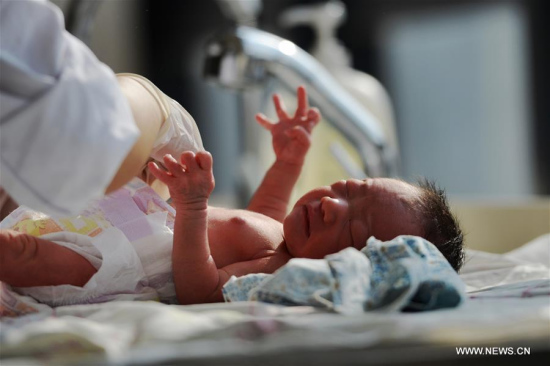
A maternity nurse takes care of a newborn after bath at the Gansu Provincial Maternity and Child-care Hospital in Lanzhou, capital of northwest China's Gansu Province, Feb. 17, 2016. The hospital saw baby boom at the beginning of the Chinese Lunar New Year, with 352 babies born from Feb. 8 to 15. (Photo: Xinhua/Chen Bin)
It's been an overwhelming week for Ding Zhigang. The anesthetist with Beijing Obstetrics and Gynecology Hospital has been assisted dozens of deliveries.
"There were so many women booked in to give birth that I had to work around the clock," Ding said. "When I finished work yesterday, I was dead on my feet."
At one point during the Lunar New Year holiday, Ding worked more than 20-hours straight, helping to bring 15 children in to the world.
"This is going to be a very, very busy year for us," he said.
Hospitals in China are facing mounting pressure as China welcomes a baby boom in the year of the Monkey, one of the 12 Chinese zodiac animals.
In Beijing alone, about 300,000 new babies will be born in 2016, 50,000 more than last year, according to figures released by Beijing's Health and Family Planning Commission. Nationwide, 22 million babies are expected to be born in 2016, almost the entire population of Beijing.
"The baby boom this year is partly a result of the belief that people born in the Year of Monkey are smart and confident," Zhai Zhenwu, president of the School of Sociology and Population Studies under Renmin University. "In addition, the new two-child policy has contributed to the growing number of pregnant women."
The baby boom, however, is casting a spell on medical institutions, with many hospitals across the country reporting a lack of beds and doctors and complaining of intensive work.
In the obstetrics wards of Shengjing Hospital of China Medical University in northeast China's Liaoning Province, three or more pregnant women have to share a double room. Extra beds have been installed down the hallway.
"The upgrade of hospital facilities has failed to keep up with rising maternity needs," said Du Juan, an official with the hospital. "Besides, we don't have enough doctors, so each one of us is working almost nonstop."
Many doctors from across the country told Xinhua they, too, were feeling the pressure.
MOUNTING PRESSURE
In China, more couples choose to have children in auspicious years, such as the dragon, horse and monkey, but this year, the situation is particularly pronounced.
At the Third Central Hospital of north China's Tianjin Municipality, there have been 51,000 labors registered for the year, a year-on-year increase of 61.9 percent.


















































